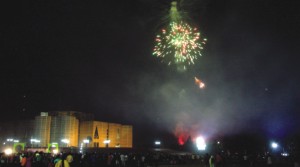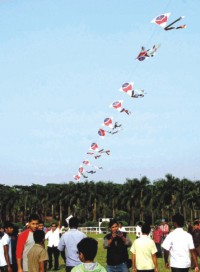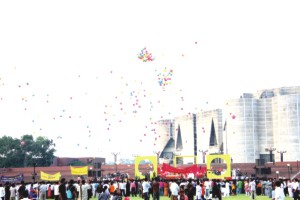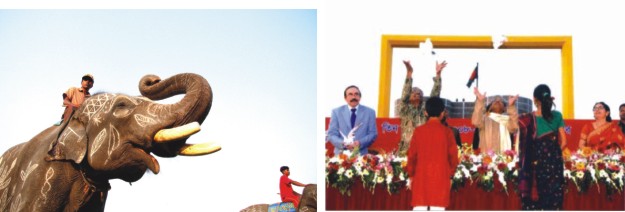|
Heritage
The Celebrations Begin
 |
Traditional food items from Old Dhaka and sports like kite flying and boat races were highlighted in the programme. |
Elita Karim
The Jatiyo Shangshad Bhaban area was an atmosphere of festivities and crowds of families and youngsters last week, when the Chief Advisor Fakhruddin Ahmed officially launched 'Dhaka Amar Dhaka' a three-year state-level celebration commemorating 400 years of Dhaka City. With pigeons, balloons and fireworks illuminating the sky, the crowds got a taste of old customs and rituals with traditional food, a car dating back to well past half a century, not to mention an elephant and its young owner looking for prospective customers.
 From the very beginning of this year both government and private organisations, including various educational institutions, have been celebrating the 400 years of Dhaka City in their own ways. While traditional food items from Old Dhaka and sports like kite flying and boat races were highlighted in several fairs and festivals in different parts of Dhaka organised by Dhaka Samity and university students, architects and activists spent a lot of time campaigning for the restoration of ancient structures and even areas like Shakharibazaar, which used to play a very significant role in trade and business in Dhaka, once upon a time. The opening ceremony of the 'Dhaka Amar Dhaka' event was organised by the Ministry of Cultural Affairs on November 28 and was attended by many government officials and well-known personalities. From the very beginning of this year both government and private organisations, including various educational institutions, have been celebrating the 400 years of Dhaka City in their own ways. While traditional food items from Old Dhaka and sports like kite flying and boat races were highlighted in several fairs and festivals in different parts of Dhaka organised by Dhaka Samity and university students, architects and activists spent a lot of time campaigning for the restoration of ancient structures and even areas like Shakharibazaar, which used to play a very significant role in trade and business in Dhaka, once upon a time. The opening ceremony of the 'Dhaka Amar Dhaka' event was organised by the Ministry of Cultural Affairs on November 28 and was attended by many government officials and well-known personalities.
Even though the ministry is yet to divulge the details of the programmes to run till 2010, the three-year programme, chalked out by the government will be celebrated with great pomp and show at both the government and non-government levels. The programme includes jubilant processions in each ward of the city with horses and elephants. Selling traditional Dhakaiya food, including Bakarkhawani, holding large-scale fairs and festivals for the people from and around Dhaka to experience the ancient flavour, children's painting competitions and various cultural programmes.
 |
With pigeons, balloons and fireworks illuminating the sky, the crowds got a taste of old customs and rituals with traditional food, a car dating back to well past half a century, not to mention an elephant and its young owner looking for prospective customers. |
According to the Shilpakala Academy authorities, a series of musical and dance shows will be held over the next three years, some of them even spreading certain messages to the people, namely, saving the Buriganga River.
The debate of the actual date, however, of the proclamation of Dhaka as a capital of Bengal continues. While one set of intellectuals and historians assert that Dhaka was declared the capital by Mughal Subedar Islam Khan in 1608, a version backed up by several popular websites, another group of scholars claim that the 400th anniversary of the capital city should be observed in 2010, as Dhaka was announced as the capital in 1610. Many theorise that this confusion arose because of the fact that even though Dhaka was probably declared the capital of Bengal in 1608, the institutional transfer actually took two years.
The cultural programmes, events and competitions will be announced accordingly, which the present day Dhakaites will be able to attend and also participate in. The events will include traditional boat races, days dedicated to kite flying, poetry recitation, classical and folk music. A few of the many interesting events include sessions of Mushaira, an interactive gathering by shayars reciting shers, a popular form of poetry recital not only in Dhaka but also in the subcontinent and a cultural programme by the residents from the sweeper colonies in Dhaka. Even though the government plans to keep the programmes and their themes Dhaka centric, contemporary acts and music will also be included later on.
Even amidst the political uncertainties that shroud the atmosphere in the country, people are making an effort to rejuvenate the ancient and colourful cultures and rituals of Dhaka, a city considered to have played a significant role in the fields of trade and culture centuries ago within the subcontinent and to an extent in the world as well. It is only a matter of time untill people all over the country will exude the same attitude in building a better and liveable Bangladesh.

.Copyright
(R) thedailystar.net 2008 |
|
